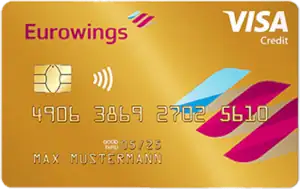How we earn our money
We finance our services on how-to-germany.com through affiliate programs.
When a user orders a financial product through our site and their application is approved, we may receive a commission from some providers. It’s important to note that this does not in any way influence our independent ratings and recommendations.
All the products we present on how-to-germany.com are selected for their quality, range of services, and excellent value for money.
Credit Card Reviews
- Card types included: Charge cards, revolving credit cards, modern debit cards
- Key criteria: No or low annual fees, travel benefits, flexible repayment, English-friendly support
- Top providers: American Express, Barclays, TF Bank, Hanseatic Bank, N26
- Suited for: Expats, newcomers, freelancers, students, and frequent travelers
- Special focus: Accessibility, Schufa requirements, bonus programs, mobile banking features, and flexible repayment options
- Our purpose: This guide is designed to help you make an informed credit card comparison across the most popular providers.
What Makes a Good Credit Card for Expats in Germany?
Germany’s banking system can be challenging for newcomers, particularly when it comes to credit cards. From unfamiliar credit types to language barriers and stringent identity verification, expats face numerous unique challenges.
Understanding what distinguishes a good German credit card from others is essential to avoid frustration and unnecessary fees.
Schufa: The Credit Check That Matters
One of the most important factors when applying for a German credit card is your Schufa status. The Schufa (Schutzgemeinschaft für allgemeine Kreditsicherung, General Credit Protection Association) is Germany’s primary credit bureau, and nearly all banks utilize it to assess creditworthiness.
For many expats, the lack of a Schufa record is a key obstacle. Without a credit history in Germany, even well-qualified applicants may be rejected. Fortunately, several providers now offer credit cards that are either accessible with limited Schufa data or come with a less strict credit rating. However, true “no Schufa” credit cards are rare and mostly restricted to prepaid credit cards and modern debit cards.
When comparing credit cards, always check whether:
- A Schufa check is performed during the application
- Your new account will be reported to Schufa, helping you build your German credit history
- A weak or absent Schufa score will automatically disqualify you
Key Selection Criteria for Expats
The best credit cards for expats provide more than just international usability. They offer flexibility, transparency, and tools that cater to a globally mobile lifestyle. Here are the most relevant features to consider:
- Accessibility & Schufa requirements: How easy is it to apply with a limited credit history?
- Basis Fees: Is the credit card free, or does it come with an annual or monthly fee?
- Bonus programs: Are there cashback or other rewards for everyday spending, travel, or partner stores?
- Mobile banking features: Is the app fully functional in English? Can you easily view transactions, repay, and manage limits? Check whether the card supports contactless payments via NFC, Apple Pay, or Google Pay.
- Cash withdrawal fees: Are ATM withdrawals free in Germany, the Eurozone, or worldwide? Some cards offer a limited number of free withdrawals per month, while others charge from the first transaction. Always check for foreign exchange fees and minimum limits. Please note that, additionally, foreign currency fees may apply if you withdraw money abroad.
- Foreign transaction fees: Are credit card payments in non-euro currencies free, or do they incur extra costs?
- Flexible repayment options: Does the card allow you to pay in full or in installments? Are the terms clear and fair, or are there hidden fees? A good credit card should fit your financial habits. Whether you prefer to pay your balance in full or need the flexibility of monthly installments, it’s important to understand how repayment works. Look out for the interest-free period, minimum payments, and whether repayments must be made manually or via direct debit.
Understanding German Credit Card Types
Most German “credit cards” belong to these 3 distinct types:
- Charge credit cards: The full balance is automatically withdrawn monthly. No interest is charged if you pay your credit card statement in full and on time.
- Revolving cards: You can repay in full or in installments, but you will pay interest if you opt for installment payments. Many credit card providers offer an extended interest-free payment period of up to 59 or 60 days.
- Debit cards: Money is deducted directly from the linked bank account — technically not a credit card, but often included in card comparisons. Modern debit cards are issued as Visa or Mastercard credit cards.
Prepaid credit cards play a relatively minor role in the German market and often come with limited functionality. They can be useful for newcomers without a German credit history or those who don’t want to open a German bank account. Popular options include the N26 Virtual Prepaid Mastercard, the Commerzbank Prepaid Mastercard, and the PayCenter SupremaCard Mastercard. These cards typically do not require a Schufa credit check and can be topped up flexibly; however, they are normally excluded from bonus programs or travel perks.
Reviewed Cards: Features, Strengths & Weaknesses
We reviewed 6 major credit card offers currently available to expats in Germany: the American Express credit cards, the TF Bank Mastercard Gold, the Barclays and Barclays Eurowings credit cards, the credit cards of the Hanseatic Bank, and the N26 Debit Mastercards.
While all offer international usability, app-based management, and mobile services (including Apple Pay, Google Pay, and contactless payments), they differ significantly in terms of costs, repayment models, travel perks, and eligibility requirements.
None of the charge and revolving credit cards tested require a specific checking account — the cards can be used with any German bank account.
N26 Master Debit Cards can only be ordered together with an N26 checking account. Prices are based not only on the cards but also on the general account features.
Overview of Reviewed Cards
| Credit Card | Type | Best For |
|---|---|---|
| American Express (esp. Gold / Platinum) | Charge Credit Card | Frequent travelers and users who seek premium benefits and rewards, free cards available (Amex Blue & Payback) |
| TF Bank Mastercard Gold | Revolving Credit Card | Free card with travel insurance and bonus features |
| Barclays Visa / Gold / Platinum Double | Revolving Credit Card | Travel benefits, flexible repayment, free card available (Barclays Visa) |
| Barclays Eurowings Classic/Premium | Revolving Card | Airline miles, Eurowings flyers |
| Hanseatic Bank GenialCard / GoldCard | Revolving Credit Card | Insurance and bonus program, free card available (GenialCard) |
| N26 Debit Mastercard | Debit Card | Mobile-first users, easy setup, free card available (N26 Standard), travel benefits, premium cards with comprehensive travel insurance |
Each card was evaluated with expat needs in mind — including foreign usage, bonus systems, ease of access, and repayment conditions.
How We Tested
Our evaluation focused on five core areas:
- Fees & foreign transaction costs: Annual fees, charges for non-Euro purchases, and cash withdrawal fees inside and outside Germany.
- Repayment flexibility: Full payment vs. installments, interest rates, and available repayment options.
- Travel & purchase insurance: Type, scope, and activation conditions of included insurance packages.
- Ease of use & mobile app: Account setup, user experience, digital features like Apple Pay, Google Pay, and real-time spending control.
- Eligibility & accessibility: Schufa requirements, income proof, and overall expat-friendliness of the application process. Each credit card company applies slightly different eligibility rules.
This allowed us to compare cards not only based on pricing or bonus programs but also on practical usability and suitability for newcomers to Germany.
American Express Credit Cards in Germany
American Express (Amex) offers a distinct model in the German market: all Amex cards operate as charge cards, meaning the full balance is automatically debited each month — there’s no revolving credit and no option to carry a balance. While this may seem restrictive, it provides good cost control and avoids interest charges. Instead of flexible repayment, Amex focuses on rewards, travel perks, and exclusive benefits.
Key Features
- Charge card system: No interest or installments — the entire balance is due monthly. You will receive each credit card statement for a 30-day period, which must be settled within 5 days.
- No Schufa-free options: American Express requires a German address and a Schufa credit check. However, the issuance of the card and individual credit limits are determined based on internal criteria.
- Bonus programs: Most cards participate in the Membership Rewards system.
- Strong mobile integration: Apple Pay, Google Pay, intuitive app.
Card Options
Amex Blue Card
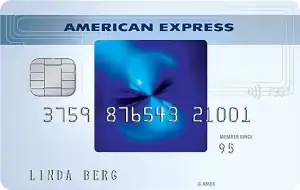
Amex Payback Card
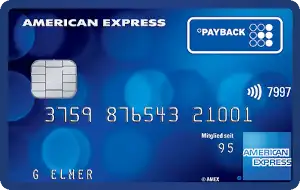
Amex Green Card
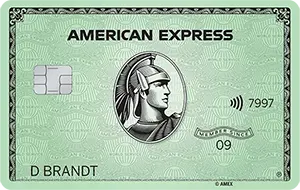
Amex Gold Card
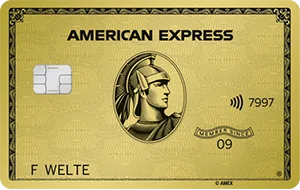
Amex Platinum Card
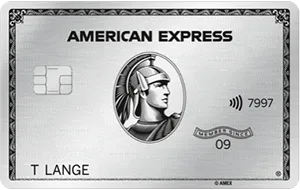
Who Should Consider Amex?
Amex cards are best suited for:
- Expats with strong credit and stable income
- Frequent travelers who value perks over flexible repayment
- Users who want to earn points on everyday spending, whether for in-store shopping, online payments, or recurring subscriptions, and redeem them for exclusive travel or lifestyle rewards
However, American Express has limited acceptance in Germany, particularly at smaller retailers and restaurants, as well as for cash withdrawals. For maximum flexibility, many users pair an American Express (Amex) with a Visa or Mastercard.
Another disadvantage is the high fees for ATM withdrawals and the lack of free foreign currency transactions.
TF Bank Mastercard Gold
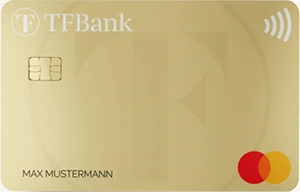
In our opinion, the TF Bank Mastercard Gold is one of the best free credit cards available in Germany. They are, like the other tested cards, also ideal for secure online shopping thanks to 2-factor authentication and mobile verification.
Barclays Credit Cards (Visa, Gold, Platinum Double)
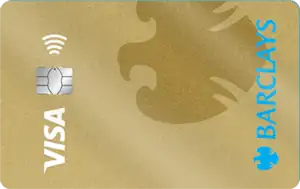
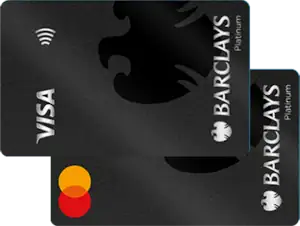
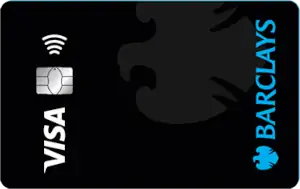
Barclays Eurowings Credit Cards (Classic & Premium)
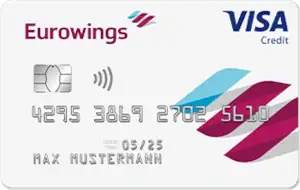
Hanseatic Bank Credit Cards (GenialCard & GoldCard)
- Type: Revolving credit cards with flexible repayment, interest-free period up to 37 days
- GenialCard: Free card with flexible repayments and no foreign transaction fees; for new customers, no interest in the first 3 months
- GoldCard: Includes comprehensive travel insurance and purchase protection
- Bonus Features: Access to discount partners and limited-time cashback offers
- Best For: Users who want a free card with strong everyday features or a premium version with insurance and shopping protection
N26 Credit Cards
N26 offers a digital-first banking experience tailored to mobile users, with a sleek app interface, real-time notifications, and compatibility with Apple Pay and Google Pay. All cards are issued as Mastercards. They don’t offer actual credit, but function as debit cards linked to your bank account.
- Mobile-first debit cards with strong app integration
- No foreign transaction fees on any card
- Premium plans include free global cash access, foreign health insurance, and other insurance benefits.
- All N26 cards — including the free Standard card — offer airport lounge access via LoungeKey, though a separate usage fee applies.
The Standard and Smart plans include 2 to 8 free ATM withdrawals per month within Germany and the Eurozone, depending on the chosen plan. However, free cash withdrawals abroad are only available with the premium cards (N26 You and Metal), making them more suitable for frequent travelers.
Premium cards also include comprehensive travel insurance, covering:
- Foreign health insurance
- Trip cancellation and interruption
- Flight and baggage delay
- Liability insurance
The N26 Metal card includes a Smartphone and shopping insurance.
Best German Credit Card Providers for Expats – Pros & Cons at a Glance
The following table summarizes the key advantages and drawbacks of each reviewed credit card provider. Use it as a quick orientation to find the provider that best suits your needs.
| Provider | Pros | Cons |
|---|---|---|
| American Express |
|
|
| TF Bank |
|
|
| Barclays |
|
|
| Barclays Eurowings |
|
|
| Hanseatic Bank |
|
|
| N26 |
|
|
Our Experience: What We Think About These Credit Cards
As financial experts specializing in expat banking in Germany, we’ve tested over 100 financial products – including all the credit cards reviewed here. Our assessment draws on both hands-on usage and a thorough analysis of terms, customer experience, and suitability for non-German residents.
We found that American Express cards remain the most attractive option for users with high travel and lifestyle demands. The Platinum Card stands out for its unmatched insurance package, lounge access, and luxury credits – but only if you make full use of its benefits. For most expats, however, the Gold Card strikes the better balance between price and perks. The main downside remains limited domestic acceptance.
For those who want a free card with premium features, the TF Bank Mastercard Gold proved to be one of the most impressive products we tested. No annual fee, no foreign usage charges, solid travel insurance – it’s hard to beat in the value-for-money category. However, the high interest rates and limited extra perks require responsible usage.
Barclays surprised us with their flexibility and competitive fee structure. The Visa Credit Card is one of the few truly free cards with worldwide ATM access, while the Platinum Double offers premium-level benefits at a mid-range price point. We especially liked the generous interest-free period (up to 59 days) and the optional installment plans.
If you’re loyal to Eurowings or the Lufthansa Group, the Eurowings credit cards by Barclays can be a smart way to collect miles, especially with the Premium version. Still, they’re best suited for frequent flyers, and their travel perks are more limited than those of the Platinum cards.
Hanseatic Bank remains a user favorite thanks to the fully free GenialCard, which impressed us with its simplicity, mobile app, and fee-free usage abroad. The GoldCard offers solid insurance and bonuses, but comes with an annual fee. Both cards are good choices for everyday users, especially if you prefer a compact, fully online setup.
Lastly, N26 is our top pick for expats who prefer modern mobile banking and don’t need a traditional credit line. All N26 cards – even the free version – offer lounge access and support Apple Pay and Google Pay. Premium plans add strong foreign health insurance and unlimited free withdrawals abroad, making them highly attractive for digital nomads.
Our verdict:
There’s no one-size-fits-all credit card for expats in Germany. Your ideal card depends on your lifestyle, spending habits, and whether you prioritize rewards, travel insurance, flexibility, or simply a free and easy solution. Fortunately, the current market offers well-suited options for every expat profile.
As an expat myself and a financial analyst with over 16 years of experience in international banking, I know how overwhelming it can be to navigate Germany’s credit card landscape — especially with terms like “Schufa,” “charge card,” and “foreign transaction fees” in the mix.
I’ve personally tested several of the reviewed cards — including the American Express Gold Card and the TF Bank Mastercard Gold — and regularly compare them against new market entrants. My go-to recommendation for most newcomers? Start with a card that offers fee transparency, international flexibility, and strong customer support, especially if you’re still building your German credit profile.
Conclusion
Germany’s credit card market may seem complex at first glance, but the good news is that there are solid options available to meet every need. Whether you’re looking for travel perks, flexible repayment, bonus programs, or zero fees, the reviewed cards offer a reliable foundation for managing your finances as an expat. A well-chosen credit card can help you save money on foreign purchases, insurance, or ATM fees. Just make sure to read the fine print, assess your spending habits, and choose a card that suits your lifestyle, not just your wallet.
Frequently Asked Questions — FAQ
Yes — but it depends on how you use the card. Some cards are advertised as completely free, but may charge fees in certain situations (e.g., interest on installment payments or foreign ATM withdrawals).
Examples of truly free cards when used correctly and without installment usage:
- Barclays Visa – no annual fee, free foreign payments, free cash withdrawals worldwide
- TF Bank Mastercard Gold – no annual fee, no foreign fees, travel insurance included if you pay in full
If you activate revolving payments and don’t repay the balance in full, you will incur interest, which makes the card no longer “free” in practice. Choosing the right free credit card depends on how you plan to use it.
To apply for a German credit card, you’ll typically need:
- A valid passport
- Proof of residence in Germany (e.g., registration certificate or rental contract)
- Proof of regular income (salary slips or tax returns)
- A German bank account for repayments
- Non-EU nationals: a German residence permit
Most providers offer a fully digital application process. During the application process, you’ll be asked to enter your personal details and verify your identity via a video call. After approval, your card is usually sent by post within a few business days.
Yes, but options are limited. Some providers, like TF Bank, work with less stringent credit requirements, making it worthwhile for expats to apply for a card even without a long credit history in Germany. Modern debit cards can be a good alternative for getting started in Germany, as digital banks often issue them without requiring a Schufa credit check.
Always check for hidden fees, interest rates on installment plans, limits on cash withdrawals, and conditions for insurance coverage. Some cards only offer full benefits if you meet specific spending or usage requirements.
Late payments can lead to interest charges, reminder fees, and potentially a negative Schufa entry. Repeated missed payments may result in your card being blocked or terminated. Always try to repay on time or contact your provider early.
